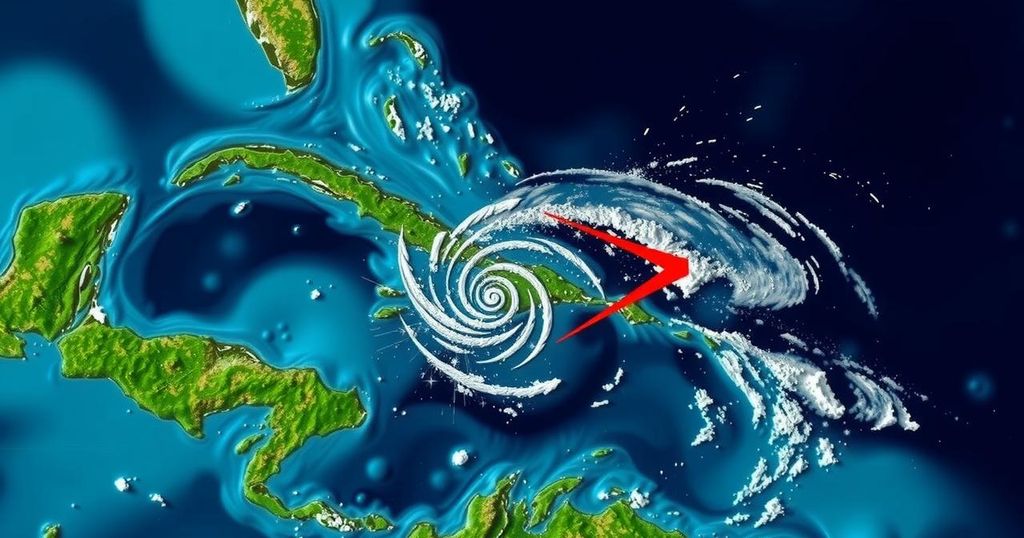Tropical Storm Oscar Advances Towards the Bahamas After Impacting Cuba

Tropical Storm Oscar advanced toward the Bahamas after striking Cuba as a Category 1 hurricane, resulting in at least six deaths and significant rainfall. With winds of 40 mph and a small wind field, Oscar was unexpected in its hurricane classification. Heavy rainfall and flooding were anticipated in the Bahamas, where warnings were issued. Concurrently, Tropical Storm Kristy developed in the Pacific, indicating an active Atlantic hurricane season.
Tropical Storm Oscar progressed towards the Bahamas on Tuesday following its landfall in Cuba as a Category 1 hurricane, resulting in the unfortunate fatalities of at least six individuals amidst severe rainfall on an island grappling with a significant power failure. As of Tuesday morning, Oscar was situated approximately 45 miles (75 kilometers) south-southeast of Long Island, Bahamas, exhibiting sustained winds of 40 mph (65 kph) while advancing north-northeast at a rate of 12 mph (19 kph), as reported by the National Hurricane Center in Miami. According to the National Hurricane Center, “Oscar is at best barely a tropical storm at this time.” Meteorological forecasts anticipated the storm to deposit rainfall quantities reaching up to 5 inches (13 centimeters) across the southeastern Bahamas, with isolated localities potentially receiving as much as 8 inches (20 centimeters). Consequently, a tropical storm warning has been issued for the central and southeastern Bahamas. Remarkably, Oscar marked a record as the smallest documented hurricane with a wind field measuring approximately 6 miles (10 kilometers) in diameter. Its rapid intensification took many by surprise as it made its initial landfall on Grand Inagua Island in the Bahamas on Saturday, followed by a second impact on eastern Cuba late on Sunday. Michael Lowry, a hurricane specialist and storm surge expert, noted, “It’s not often we see a colossal failure in hurricane forecasting,” highlighting the unexpected nature of Oscar’s development into hurricane status, which was not indicated by forecasting models. The storm unleashed at least 15 inches (38 centimeters) of rain in particular regions of eastern Cuba on Monday, leading to warnings of extensive flooding and the possibility of landslides. The fatalities reported were concentrated in the Guantánamo region. The impact of the storm coincided with Cuba’s ongoing recovery efforts from a significant blackout, which incited minor protests and prompted a stern governmental warning against potential unrest. Oscar has been designated as the 15th named storm and 10th hurricane of the 2023 Atlantic hurricane season, which officially commenced on June 1 and is scheduled to conclude on November 30. The National Oceanic and Atmospheric Administration (NOAA) had forecasted an above-average hurricane season this year, attributing this prediction to exceptionally warm ocean temperatures, projecting 17 to 25 named storms and four to seven major hurricanes reaching Category 3 or higher. In another development, Tropical Storm Kristy was noted to be organizing over open waters in the Pacific Ocean. At the same time, it was approximately 375 miles (605 kilometers) west-southwest of Acapulco, Mexico, featuring maximum sustained winds of 50 mph (85 kph) and a west-northwest movement at a pace of 15 mph (24 kph). Kristy is anticipated to escalate into hurricane status by Tuesday evening.
The article discusses Tropical Storm Oscar and its impact on the Caribbean, particularly following its classification as a hurricane upon making landfall in Cuba. This storm is notable for its rapid intensification and the historical record as the smallest hurricane. The article also references the broader context of the Atlantic hurricane season, which is characterized by a forecast of increased storm activity due to unusual ocean temperature patterns. Additionally, it touches on the implications of Oscar’s effects in the context of ongoing power struggles in Cuba, highlighting societal ramifications of natural disasters.
In summary, Tropical Storm Oscar has significantly affected the Caribbean region, particularly Cuba, with severe rainfall and loss of life following its unexpected landfall as a hurricane. The storm has highlighted challenges in hurricane forecasting and occurs against the backdrop of Cuba’s ongoing recovery from a major power outage, underscoring the complex interplay between natural disasters and social stability. Experts continue to monitor Oscar’s trajectory, as it is projected to affect the Bahamas and add to the already critical Atlantic hurricane season.
Original Source: www.usnews.com








